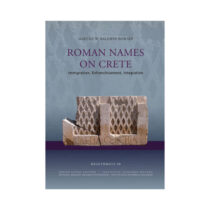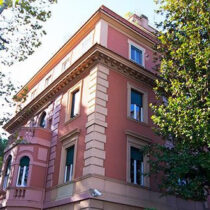The School of Humanities of the International Hellenic University is organizing the 2nd Summer School in Ancient Technology and Crafts. The seminars will take place on 30.06.-11.07.2014, in Thessaloniki, Greece.
Programme Outline and Goals
Progress and innovation in technology were of exceptional importance for the development of ancient societies. Ancient technologies and crafts are of interest to archaeologists and historians but also many other scientists. The International Hellenic University Summer School in Ancient Technologies and Crafts offers the opportunity to study different aspects of the technological advances of ancient cultures, with a principal focus on ancient Greece, revealing the outstanding technological level that in fact the ancient civilizations had reached.
In the course of the programme, the latest historical research along with state-of-the-art scientific techniques applied to the analysis of archaeological findings will be presented by senior academics and field archaeologists who are experts in various research areas, such as the exploitation of natural resources, the crafts exercised in everyday life or recorded by state bureaucracy, building technology, the outcomes of the interconnection between technology and science or technology and ideology, etc.
The Summer School on Ancient Technology is planned to be held annually with the aim of a) providing an international forum on technological achievements of the ancient Greek world and b) making greater use of the rich resources of Greece in terms of specialists in ancient technology research.
The aim of this 2-week intensive school is to make the participants more acquainted with aspects of ancient technologies by providing up-to-date knowledge presented and discussed by the experts of the relevant fields. It is of great benefit for the students to study ancient technologies and crafts in a location such as Northern Greece where in recent years major works in preservation have been accomplished by applying modern techniques and ideas and the museum exhibitions display impressive results of ancient technologies.
Programme Scientific Director
Dr Anna Michailidou, Research Director Emerita, Research Centre for Greek and Roman Antiquity, Institute of Historical Research, The National Hellenic Research Foundation.
Programme Scientific Coordinator
Dr Georgia Aristodemou, Researcher of Roman Archaeology, Academic Associate, School of Humanities, International Hellenic University
Subject Topics and Programme Structure
The series of lectures deploy around three interconnected topics. Each year the School will focus on at least two research areas from each topic, with a variety of lectures offered for each field. For 2014, the series of lectures offered are:
Introductory Lecture: An Introduction to the Ancient Greek Technology, by Prof. Dr Theodosios Tassios, Civil engineer, Professor Emeritus, National Technical University, Athens, Greece, President of the Association of Ancient Greek Technology Studies, Member of the Academy of Sciences of Turin.
ANCIENT TECHNOLOGY: FROM MATERIAL RESOURCES TO FINAL PRODUCTS
-Metallurgy and metal working
-Glass working
-Building Technology
-Ceramic Technology
ANCIENT TECHNOLOGY AND SCIENCE
-Measurement and Standards
-Script Technology and Knowledge Transfer
-Mechanisms and Machines
-Ship Building and Navigation
ANCIENT TECHNOLOGY, ART AND IDEOLOGY
-Technology and Art in the service of Ideology
-Water management in urban environment
-Methods of Exploration and Restoration of the built environment
Working Hours
For the period of two weeks, the lectures will take place six hours daily (a total of 60 hours), from Monday to Friday, at the International Hellenic University, Thessaloniki, Greece. The individual workload is estimated to require a further 30 hours of study. All lectures will be in English. During weekends, the School will organize optional excursions to major museums and sites of Thessaloniki and Macedonia.
For a number of students who wish to extend their stay for another week, the summer school may arrange for them to take part in an archaeological excavation in the region of Macedonia (30 hours). If you are interested in this possibility please state it in your application form.
Options of Archaeological Field Practice are also offered (see below). A number of about five positions on each option and priority will be given based on the date of application to the summer school.
Course Credits
A Certificate of Attendance will be provided at the end of the program to all participants who have fulfilled the course requirements. Students/graduates taking the course for credit at their home institutions will also have to deliver an Essay paper in order to obtain 4.5 ECTS credits. Since degree requirements vary among universities, students/graduates are advised to ensure, preferably in advance, that their college or university will recognize such certification and award the suggested credits.
Participants and Application Procedure
The Summer School on Ancient Technology and Crafts welcomes applicants from a wide range of educational background. Participants can be undergraduate students and graduates of related disciplines (Archaeology, Architecture, Museology, Conservation Studies, History, Tourism, Political Science, etc.). Applications from other professionals with an interest in archaeology and ancient technology will also be taken into consideration. Applicants should be well acquainted with the English language.
In order to apply, you need to complete the online application form.
All applicants will be notified of admission decisions by e-mail in the next 10 working days upon receiving their application.
The course is open to a maximum of 35 participants whilst IHU reserves the right to postpone the Summer Course for the next year, in case a minimum enrolment is not achieved by 31st May 2014.
Accommodation and Tuition Fees
The tuition fees are 650 €. Participants will have to cover their travel, accommodation and everyday expenses. Participants can choose accommodation from a variety of options, with prices starting from 100 € for the whole 2 weeks. The additional tuition fees for the third week of the Summer School are 100€.
For payment procedures please contact Mrs Konstadina Karaiskou at [email protected] or call 0030-2310 807529.
Discounts and fellowships
Early bird registration: Participants who will register before 20 May 2014 will receive a discount of 10%.
International Hellenic University students and alumni are entitled to a discount of 20% while participants who intend to study at IHU in the following year will receive a major discount in their MA tuition fees. A small number of fellowships will also be offered based upon merit and financial need.
Field Practice
So far, the options regarding archaeological excavation field practice are:
i. The excavation site of Karabournaki, possibly of the ancient city of Therma, at the eastern suburbs of Thessaloniki. The site dates from the Late Bronze Age down to the Roman times, with a flourishing period during the Archaic times (7th – 6th centuries B.C.) and it preserves the remains of a settlement placed on the top of a low mound, with its cemeteries extended in the surrounding area and the ancient harbor reaching the lower part of the hill. The site preserves a great number of ceramics, local and imported, in a remarkable quantity as well as quality.
The actual excavation might not be carried out this year but there will be a great deal of work on studying, registering, recording, restoring, designing and photographing the archaeological material. The Aristotle University excavations at the site are directed by Prof. M. Tiverios and his associates: Assistant Professor E. Manakidou and Senior Researcher Dr. D. Tsiafaki.
ii. The excavation site of the Ancient Agora of Pella, the capital of the ancient kingdom of Macedonia by the end of the 5th century B.C., birthplace and seat of the king Philip II and of his son, Alexander the Great! The ancient agora covers 70000 square meters and contained multiple buildings and workshops attesting to the city’s economic strength – from ceramic and sculpture studios, to metal processing, food and perfume manufacturing, administrative offices and the city’s archive, containing the clay stamps of papyrus records.
The Aristotle University excavation at the site is directed by Prof. I. Akamatis. Using the public bus, the site is at about 1 hour from the centre of Thessaloniki.
For more information please contact Mrs Konstadina Karaiskou at [email protected] or call 0030-2310 807529.




